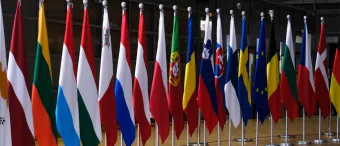The Stakes of the Biden-Putin Summit: The Perspective of Small States

The Stakes of the Biden-Putin Summit: The Perspective of Small States
On the eve of the Geneva summit between the American and the Russian presidents, the GCSP hosted a discussion with UN delegations of small states to share views about this event from their perspective and their role in multilateral diplomacy.
Jean-Marc Rickli, Head of Global and Emerging Risks, GCSP moderated the discussion that included opening remarks by Amb. Thomas Greminger, Director, GCSP, and Amb. Umej Bhatia, Permanent Representative of Singapore in Geneva, as well as comments by Amb. Elaine Whyte-Gomez, former Permanent Representative of Costa Rica in Geneva, now Executive-in-Residence Fellow, GCSP, Mr John Erath, Policy Director, Center for Arms Control and Nonproliferation, and Government Fellow, GCSP, Ms Alexandra Matas, Head of Effective Governance, GCSP, and Mr Marc Finaud, Head of Proliferation and Diplomatic Tradecraft, GCSP.
A geopolitical analysis of the US-Russian summit concluded that, although this event was of primary interest to both countries considering the deteriorated state of their relations, its convening and success were also in the interest of the international community, including small states. Indeed those states could be directly affected by many issues that depend on the behaviour of the great powers: regional conflicts in which the great powers are involved, their disagreement on measures to prevent escalation or eruption of crises, their differences of view on solutions to global challenges such as the risk of nuclear war, the climate crisis, cybersecurity, the pandemics, etc.
The US approach to the summit was seen as a means of securing a “stable and predictable relationship” with Russia, which would also benefit from this stability after four years of an unpredictable US administration. Moscow’s expectations were to be recognized as a trustworthy partner and reassured on the US intentions. Some speakers suggested that, in order to improve mutual trust, each side needed to make the effort to understand better the other side’s threat perceptions. Most importantly, all panellists agreed that this summit meeting was a historic opportunity to revive multilateralism, especially in Geneva, where so many global challenges are addressed and need the support of great powers. In particular, if both presidents could agree on announcing new arms control and strategic stability talks, ideally in Geneva, this could be considered as a major advance.
It is in this regard that small states can play an important role in launching initiatives, offering compromise solutions, acting as honest brokers that do not threaten the interests of the great powers. Recent examples include the work accomplished by the Forum of Small States launched by Singapore, with 180 members and chapters in Geneva, Vienna, and New York. One can also mention the successful negotiation chaired by Costa Rica of the Treaty on the Prohibition of Nuclear Weapons or by Switzerland of the report of the Open-ended Working Group on cyber security.
The GCSP will continue to offer a platform to small states where topics of their interest will be discussed.
> More on the GCSP and the Biden-Putin Summit
Disclaimer: The views and opinions expressed in the written texts published by the Geneva Centre for Security Policy (GCSP) are the authors’ own and do not necessarily reflect those of the GCSP, its Foundation Council members or its employees. The GCSP is not responsible for and may not always verify the accuracy of the information contained in written publications submitted by a writer.
Marc Finaud is a former French diplomat who was seconded to the GCSP from 2004 to 2013 and is now a staff member. At the GCSP, Mr Finaud was leading activities related to Arms Proliferation.
